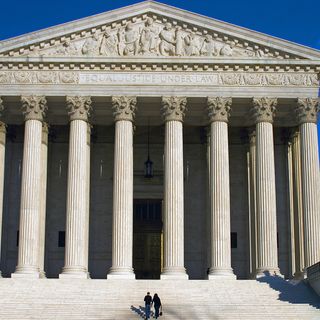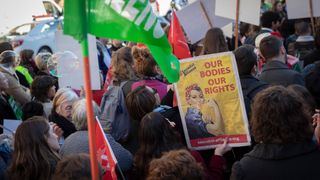Polling by the United States Studies Centre shows that current New South Wales (NSW) abortion laws are out of step with public opinion.
NSW voters are no less likely than those in other states to support a woman’s right to choose to have an abortion, with 60 per cent saying a woman should be able to obtain an abortion as a matter of personal choice.
Australians mostly believe abortion is a matter of personal conscience, Americans more divided
The Reproductive Health Care Reform Bill 2019 is currently being considered by the NSW Legislative Council. The bill, which was introduced by Independent Alex Greenwich and co-sponsored by 15 members of parliament from different parties, would bring the state laws of NSW in line with other Australian states, and remove abortion from the criminal code.
This debate has revived the issue in New South Wales. Prior to this, abortion had not been highly salient in Australian politics. The reverse is true in the United States, where the debate has been consistently heated and politicised since 1973 when the US Supreme Court ruled on Roe v Wade. The landmark finding defined a pregnant woman’s liberty to choose to have an abortion without excessive government restriction and struck down a number of state laws similar or more restrictive than the currently enforced NSW legislation.
But while the NSW Parliament is debating whether to ease restrictions, many American states are introducing legislation that pushes for highly-restrictive abortion laws. The Trump administration’s appointment of a swathe of conservative judges in the country’s appellate courts, as well as the appointments of justices Gorsuch and Kavanaugh to the Supreme Court, have been seen as a part of an attempt to pose the first credible challenge to the Roe v Wade precedent.
Explainer: Reproductive rights in the United States

To learn more about American and Australian attitudes towards issues like abortion, the United States Studies Centre (USSC) and YouGov polled 1,800 Americans and 1,820 Australians in late July.
USSC Lecturer in Political Science Dr Shaun Ratcliff said the NSW legislation would shift state law closer to the preferences of the Australian public.
“Broadly speaking, a majority of Australians believe abortion is a matter of personal conscience and should not be restricted by the law,” he said.
“Study after study has shown this. The results of our survey showed this remains the case, with Australians supportive of women being able to obtain an abortion as a matter of personal choice, regardless of context."
This is less the case in the United States, Dr Ratcliff said. There the public remains more divided.
“Fifty-eight per cent of Australians support unrestricted access to abortion, compared with 42 per cent of Americans,” he said.
“Americans are more likely to believe that abortion should never be permitted or only in exceptional circumstances. These are the views of only a very small minority in Australia.”
According to these data, Americans are more likely to believe abortion should only be permitted in case of rape, incest or when the woman’s life is in danger (26 per cent in the United States compared with 16 per cent in Australia) and that it should never be permitted (13 per cent in the United States and 5 per cent in Australia).
Attitudes towards abortion
|
Response |
Australia (%) |
United States (%) |
Difference (%) |
|
By law, a woman should always be able to obtain an abortion as a matter of personal choice |
58 |
42 |
-16 |
|
The law should permit abortion for other reasons, but only after the need has been established |
19 |
12 |
-7 |
|
The law should permit abortion only in case of rape, incest, or when the woman’s life is in danger |
16 |
26 |
10 |
|
By law, abortion should never be permitted |
5 |
13 |
8 |
|
Other |
2 |
6 |
4 |
Women and men hold similar attitudes
United States Studies Centre Research Assistant and Data Visualisation Analyst Zoe Meers said that across both countries there was a modest but consistent gender gap on abortion.
“Women in Australia and the United States are slightly more likely to believe that women should be able to obtain an abortion as a matter of personal choice, but are no less likely to say it should never be permitted,” she said.
“In both countries this gap is of a similar size. In Australia, women are approximately 8 per cent more likely to say abortion should always be a matter of personal choice, and in the United States women are 7 per cent more likely to do so.
“This gap is largely driven by younger women in Australia. Seventy per cent of Australian women aged 18-29 say they believe it should always be a personal choice, while 53 per cent of men of the same age agree. There was very little gender gap between men and women aged 65 and above.
“In the United States, though, the gender gap is of a similar size in all age groups, except men and women aged 30-44, where among both genders just over 40 per cent said abortion should always be a personal choice for a woman. Although even here, more men than women believe it should never be permitted.”
Breakdown by gender
|
|
Australia |
United States |
||
|
Response |
Female (%) |
Male (%) |
Female (%) |
Male (%) |
|
By law, a woman should always be able to obtain an abortion as a matter of personal choice |
62 |
54 |
46 |
39 |
|
The law should permit abortion for other reasons, but only after the need has been established |
16 |
22 |
11 |
14 |
|
The law should permit abortion only in case of rape, incest, or when the woman’s life is in danger |
14 |
17 |
24 |
29 |
|
By law, abortion should never be permitted |
6 |
5 |
14 |
12 |
|
Other |
2 |
2 |
5 |
6 |
Religion is a major driver
In both countries, religion was a major driver for opposition to a woman always being able to obtain an abortion as a matter of personal choice.
Meers said that while approximately 74 per cent of Australians with no religion supported free choice for women, fewer than half of Christian voters agreed. However, even among those who identified as religious, only around 10 per cent believed abortion should be completely banned, with many believing it should be restricted to exceptional circumstances.
In the United States, support for a complete ban was higher. However, even among Protestant or other Christians – who were overall the most opposed to abortion – only around 20 per cent supported a complete ban.
“This indicates that even among those identifying as religious, there is support for women to be able to access abortion services, even if there are some restrictions required,” Meers said.
In Australia, there was also little difference between spondents living in rural and metropolitan areas.
Breakdown by religion (Australia)
|
Response |
No religion (%) |
Other (%) |
Catholic (%) |
Protestant (%) |
Other Christian (%) |
|
By law, a woman should always be able to obtain an abortion as a matter of personal choice |
74 |
51 |
47 |
46 |
39 |
|
The law should permit abortion for other reasons, but only after the need has been established |
14 |
22 |
24 |
24 |
16 |
|
The law should permit abortion only in case of rape, incest, or when the woman’s life is in danger |
8 |
19 |
20 |
20 |
33 |
|
By law, abortion should never be permitted |
2 |
7 |
7 |
8 |
11 |
|
Other |
2 |
2 |
2 |
2 |
1 |
Breakdown by religion (United States)
|
Response |
No religion (%) |
Other (%) |
Catholic (%) |
Protestant (%) |
Other Christian (%) |
|
By law, a woman should always be able to obtain an abortion as a matter of personal choice |
62 |
46 |
34 |
31 |
29 |
|
The law should permit abortion for other reasons, but only after the need has been established |
12 |
16 |
15 |
12 |
10 |
|
The law should permit abortion only in case of rape, incest, or when the woman’s life is in danger |
14 |
24 |
35 |
31 |
34 |
|
By law, abortion should never be permitted |
6 |
5 |
12 |
18 |
23 |
|
Other |
6 |
8 |
4 |
8 |
4 |
Attitudes in NSW similar to other states
According to Dr Ratcliff, there was little differences between public opinion in NSW and other states.
“Examining breakdowns of support and opposition to abortion by state in Australia, we find that the residents of NSW have broadly similar attitudes on this issue than those of other Australian states,” he said.
“This suggests that the delay in taking this off the criminal code here compared to other jurisdictions has very little to do with the preferences of the public.”
Breakdown by Australian state
|
Response |
ACT (%) |
NSW (%) |
NT (%) |
QLD (%) |
SA (%) |
TAS (%) |
VIC (%) |
WA (%) |
|
By law, a woman should always be able to obtain an abortion as a matter of personal choice |
61 |
60 |
56 |
56 |
52 |
62 |
59 |
58 |
|
The law should permit abortion for other reasons, but only after the need has been established |
10 |
18 |
20 |
19 |
24 |
21 |
18 |
21 |
|
The law should permit abortion only in case of rape, incest, or when the woman’s life is in danger |
12 |
15 |
24 |
17 |
16 |
12 |
15 |
17 |
|
By law, abortion should never be permitted |
8 |
6 |
|
5 |
8 |
4 |
5 |
4 |
|
Other |
9 |
1 |
|
2 |
1 |
2 |
3 |
0 |
Partisan gap larger in America than Australia
Dr Ratcliff said that as with many other issues, the partisan gap was also much larger in the United States than Australia.
“In Australia, two-thirds of Labor voters support unrestricted rights for women to obtain abortions, while 47 per cent of Coalition voters hold the same opinion; a gap of 19 per cent,” he said.
“Only about 3 per cent of Labor voters and 7 per cent of Coalition supporters want to ban abortions entirely. In the United States, only 15 per cent of Republicans believe that women should be able to obtain an abortion as a matter of personal choice, compared with 68 per cent of Democrats; a gap of 53 per cent.
“Conversely, more Republicans support a total ban on abortions than want women to have unrestricted access, with 22 per cent saying they should never be permitted, while only 3 per cent of Democrats hold this view.”
Breakdown by vote
|
|
Australia |
United States |
|||
|
Response |
Coalition (%) |
Greens (%) |
Labor (%) |
Republican (%) |
Democratic (%) |
|
By law, a woman should always be able to obtain an abortion as a matter of personal choice |
47 |
80 |
66 |
15 |
68 |
|
The law should permit abortion for other reasons, but only after the need has been established |
23 |
12 |
17 |
12 |
12 |
|
The law should permit abortion only in case of rape, incest, or when the woman’s life is in danger |
21 |
5 |
13 |
41 |
12 |
|
By law, abortion should never be permitted |
7 |
1 |
3 |
22 |
5 |
|
Other |
1 |
2 |
1 |
9 |
3 |
About the data
These surveys were fielded by the United States Studies Centre on the YouGov online panel in both the United States and Australia between 23-29 July 2019. Responses were weighted by YouGov to ensure samples representative of the Australian and American populations. The Australian sample was weighted by age, gender and location. The US sample was weighted by age, gender, race, education, and vote choice at the 2016 presidential election.
The margin of error is approximately ± 2.5 percentage points for results reported for the full sample of both the Australian and American surveys. It is larger for sub-groups of the full samples and for differences between the countries.








